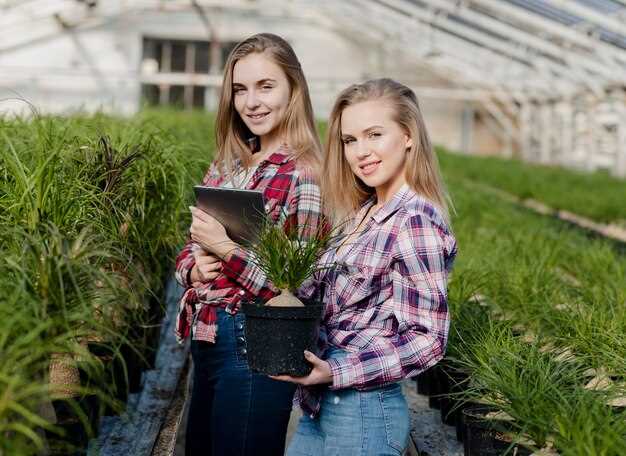
In today’s rapidly changing world, there is an urgent need for innovative solutions to address the pressing environmental challenges we face. As we strive for a more sustainable future, it is crucial to recognize the immense potential of young individuals in shaping the world we live in. By harnessing their passion, creativity, and determination, we can pave the way for a greener and more prosperous tomorrow.
Within the realm of agriculture, a sector that plays a pivotal role in our society, youth engagement holds immense promise. The cultivation of crops, the rearing of livestock, and the preservation of natural resources are just a few aspects of sustainable agriculture that require fresh perspectives and innovative approaches. By actively involving young people in these endeavors, we can tap into their unique insights and ideas, fostering a culture of sustainability that will benefit both present and future generations.
It is important to recognize that youth involvement in sustainable agriculture goes beyond mere participation. It is about empowering young individuals to become agents of change, equipping them with the knowledge, skills, and resources needed to make a meaningful impact. Through mentorship programs, educational initiatives, and hands-on experiences, we can nurture a new generation of environmentally conscious farmers, scientists, and policymakers who will lead the way towards a more sustainable and resilient agricultural sector.
The Significance of Youth Participation in Sustainable Farming

Today’s generation of young individuals plays a crucial role in shaping the future of agriculture by actively engaging in sustainable farming practices. Their involvement in this field is of utmost importance as it brings fresh perspectives, innovative ideas, and a deep understanding of the pressing environmental challenges we face. By actively participating in sustainable agriculture, young people contribute to the development of a more environmentally conscious and resilient agricultural sector.
Young individuals possess a unique set of skills and knowledge that can be harnessed to drive positive change in the agricultural industry. Their enthusiasm, creativity, and adaptability enable them to explore and implement sustainable farming techniques that promote ecological balance, conserve natural resources, and mitigate the adverse effects of climate change. By embracing sustainable practices, young farmers can create a greener and more sustainable future for generations to come.
Furthermore, youth involvement in sustainable agriculture fosters a sense of responsibility and ownership towards the environment. By actively participating in the cultivation of crops and the rearing of livestock using sustainable methods, young individuals develop a deep appreciation for the interconnectedness of nature and agriculture. They understand the importance of preserving biodiversity, protecting soil health, and minimizing the use of harmful chemicals. This knowledge empowers them to make informed decisions and take actions that contribute to the long-term sustainability of our food systems.
Additionally, youth engagement in sustainable farming provides an opportunity for intergenerational knowledge exchange. By working alongside experienced farmers and agricultural experts, young individuals can learn from their wisdom and traditional practices while also introducing new ideas and technologies. This collaboration between different generations fosters innovation and ensures the continuity of sustainable farming practices, bridging the gap between traditional wisdom and modern advancements.
| Benefits of Youth Involvement in Sustainable Agriculture: |
|---|
| 1. Enhanced environmental stewardship |
| 2. Promotion of sustainable farming techniques |
| 3. Preservation of biodiversity |
| 4. Interconnectedness of nature and agriculture |
| 5. Intergenerational knowledge exchange |
Empowering Youth Through Education and Training

Enabling the younger generation to actively participate in the development of sustainable agricultural practices is crucial for building a more environmentally conscious and prosperous future. By equipping young individuals with the necessary knowledge and skills through education and training, we can empower them to make a positive impact on the agricultural sector and contribute to the creation of a greener and more sustainable world.
Education:
Education plays a pivotal role in empowering youth to become agents of change in the realm of sustainable agriculture. By providing comprehensive and accessible educational opportunities, we can foster a deeper understanding of the interconnectedness between agriculture, the environment, and society. Through formal education programs, workshops, and seminars, young individuals can gain a solid foundation in sustainable agricultural practices, resource management, and environmental conservation.
Training:
Complementing formal education, practical training is essential for empowering youth to apply their knowledge and skills in real-world agricultural settings. Hands-on training programs offer invaluable opportunities for young individuals to gain practical experience in sustainable farming techniques, organic cultivation methods, and innovative technologies. By engaging in experiential learning, youth can develop a deeper appreciation for the importance of sustainable agriculture and acquire the necessary skills to implement eco-friendly practices.
Empowerment:
Empowering youth through education and training not only equips them with the tools and knowledge needed for sustainable agriculture but also instills a sense of empowerment and agency. By actively involving young individuals in decision-making processes and providing them with leadership opportunities, we can foster a generation of environmentally conscious and socially responsible agricultural leaders. Empowered youth can drive positive change, advocate for sustainable practices, and inspire others to join the movement towards a greener future.
In conclusion, by prioritizing education and training for youth in sustainable agriculture, we can empower them to become catalysts for change. Through comprehensive education, practical training, and opportunities for leadership, young individuals can actively contribute to the development of a greener and more sustainable agricultural sector, ensuring a brighter future for generations to come.
Innovative Technologies for Youth-led Sustainable Farming
In this section, we will explore the cutting-edge technologies that are revolutionizing the field of sustainable farming, particularly when it comes to the involvement of young individuals. These innovative solutions are paving the way for a greener and more efficient future in agriculture.
One of the key advancements in youth-led sustainable farming is the integration of precision agriculture techniques. By utilizing satellite imagery, drones, and sensors, farmers can gather real-time data on soil moisture levels, crop health, and nutrient requirements. This data-driven approach allows for more targeted and precise farming practices, reducing the need for excessive pesticide and fertilizer use.
Another exciting technology that is empowering young farmers is vertical farming. This method involves growing crops in vertically stacked layers, often in urban environments or controlled indoor settings. Vertical farming maximizes space utilization and minimizes water consumption, making it an ideal solution for urban areas with limited land availability. Additionally, the controlled environment allows for year-round production and protection against pests and diseases.
Robotics and automation are also playing a significant role in youth-led sustainable farming. Autonomous robots can perform tasks such as planting, weeding, and harvesting with precision and efficiency. These robots not only reduce labor costs but also minimize the environmental impact by eliminating the need for chemical herbicides and reducing soil compaction caused by heavy machinery.
Furthermore, the use of blockchain technology is revolutionizing the transparency and traceability of agricultural supply chains. By utilizing a decentralized and immutable ledger, farmers can track the journey of their produce from farm to table, ensuring fair trade practices and reducing food waste. This technology empowers young farmers to connect directly with consumers, fostering trust and promoting sustainable farming practices.
| Advancements in Youth-led Sustainable Farming |
|---|
| Precision agriculture techniques |
| Vertical farming |
| Robotics and automation |
| Blockchain technology |
In conclusion, the integration of innovative technologies in youth-led sustainable farming is transforming the agricultural landscape. These advancements enable young individuals to adopt more efficient and environmentally friendly practices, ensuring a greener future for generations to come.
Youth-led Initiatives: Inspiring Change in Agriculture
In the realm of sustainable farming and cultivating a more environmentally friendly future, the younger generation has emerged as a driving force for change. Through their innovative and forward-thinking initiatives, these young leaders are revolutionizing the agricultural landscape, fostering a greener and more sustainable future.
Empowering the Next Generation
One of the key aspects of youth-led initiatives in agriculture is the empowerment of the next generation. These initiatives aim to provide young individuals with the knowledge, skills, and resources necessary to actively participate in and shape the agricultural sector. By equipping them with the tools they need, these initiatives inspire and encourage young people to take charge and make a difference in sustainable agriculture.
Cultivating Innovation and Collaboration
Another crucial element of youth-led initiatives is the cultivation of innovation and collaboration. Young individuals bring fresh perspectives and ideas to the table, challenging traditional practices and pushing the boundaries of what is possible in agriculture. Through collaboration with experts, farmers, and other stakeholders, these initiatives foster an environment that encourages the exchange of ideas and the development of innovative solutions to address the challenges faced by the agricultural industry.
By harnessing the energy, passion, and creativity of the youth, these initiatives are inspiring change in agriculture. They are not only shaping the future of sustainable farming but also creating a platform for young individuals to actively engage in building a greener and more sustainable world.
Overcoming Challenges: Encouraging Youth Participation in Sustainable Agriculture
Addressing the obstacles and fostering active involvement of young individuals in the realm of environmentally-friendly farming practices is crucial for the advancement of sustainable agriculture. By surmounting these hurdles, we can inspire and motivate the younger generation to actively participate in the cultivation of a greener and more sustainable future.
1. Education: Providing comprehensive and accessible education on sustainable agriculture is paramount in encouraging youth participation. By equipping young individuals with the knowledge and skills necessary to understand the importance of sustainable farming practices, we can empower them to actively engage in this field.
2. Access to Resources: Ensuring that young farmers have access to the necessary resources, such as land, seeds, and tools, is essential for their active involvement in sustainable agriculture. By removing barriers and facilitating access to these resources, we can encourage more youth to embrace environmentally-friendly farming practices.
3. Financial Support: Offering financial support and incentives to young farmers can significantly boost their participation in sustainable agriculture. By providing grants, loans, and subsidies, we can alleviate the financial burden and encourage young individuals to pursue careers in this field.
4. Mentorship and Networking: Establishing mentorship programs and fostering networking opportunities between experienced farmers and young individuals can be instrumental in overcoming challenges. By connecting young farmers with seasoned experts, we can provide guidance, support, and valuable insights, thus encouraging their active engagement in sustainable agriculture.
5. Recognition and Rewards: Recognizing the efforts and achievements of young individuals in sustainable agriculture is crucial for encouraging their continued participation. By highlighting success stories and providing rewards, such as awards and scholarships, we can inspire and motivate more youth to contribute to the greener future of agriculture.
By addressing these challenges and implementing strategies to encourage youth participation in sustainable agriculture, we can pave the way for a more environmentally-conscious and sustainable future.
The Role of Government and NGOs in Supporting Youth Involvement in Sustainable Farming
Government bodies and non-governmental organizations (NGOs) play a crucial role in fostering and supporting the active participation of young individuals in the realm of sustainable agriculture. By providing various forms of assistance, guidance, and resources, these entities contribute to the development of a greener and more sustainable future.
Government Initiatives
The government has a significant role to play in creating an enabling environment for youth engagement in sustainable farming. Through the implementation of policies and regulations that prioritize sustainable agricultural practices, governments can encourage young individuals to actively participate in this sector. Additionally, governments can provide financial incentives, grants, and subsidies to support young farmers in adopting sustainable farming techniques and technologies.
NGO Support
Non-governmental organizations also play a vital role in supporting youth involvement in sustainable agriculture. These organizations often provide training programs, workshops, and mentorship opportunities to equip young individuals with the necessary knowledge and skills to engage in sustainable farming practices. NGOs can also facilitate networking and collaboration among young farmers, enabling them to share experiences, exchange ideas, and collectively address challenges in the field.
Furthermore, NGOs can advocate for policies and initiatives that promote sustainable agriculture and youth engagement at local, national, and international levels. By raising awareness about the importance of sustainable farming and the potential benefits it offers, NGOs can garner support from various stakeholders and encourage governments to prioritize this sector.
In conclusion, the active involvement of government bodies and NGOs is essential in supporting and empowering young individuals to engage in sustainable farming practices. Through their initiatives, these entities can provide the necessary resources, guidance, and advocacy to create a greener and more sustainable future in the agricultural sector.








